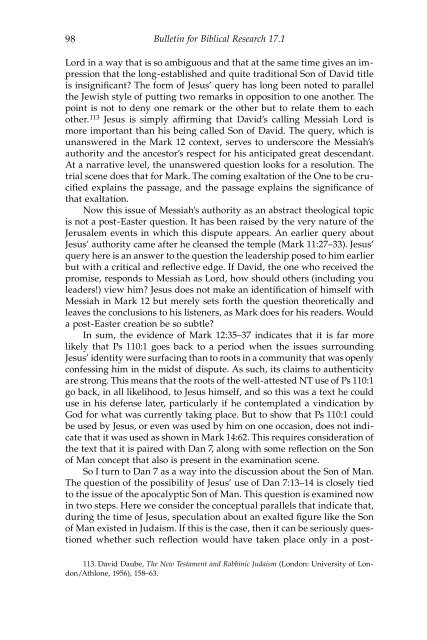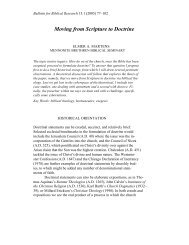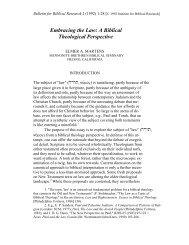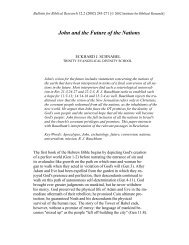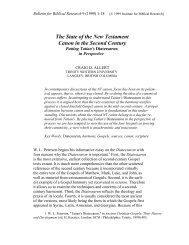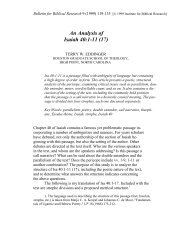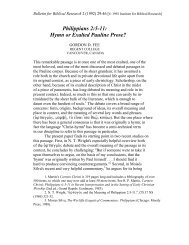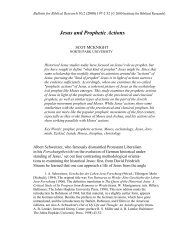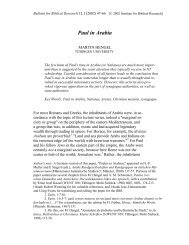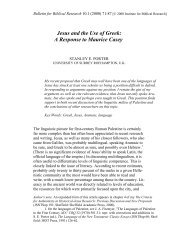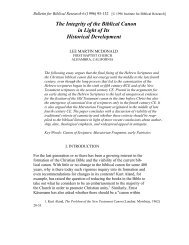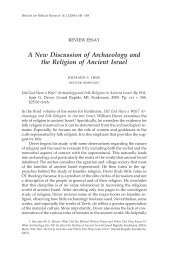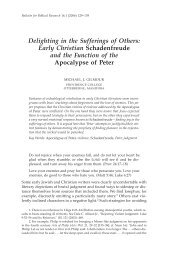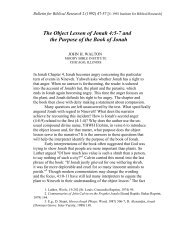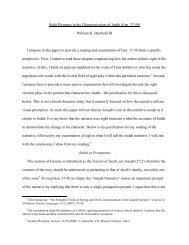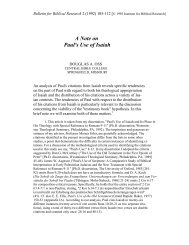Blasphemy and the Jewish Examination of Jesus - Institute for ...
Blasphemy and the Jewish Examination of Jesus - Institute for ...
Blasphemy and the Jewish Examination of Jesus - Institute for ...
Create successful ePaper yourself
Turn your PDF publications into a flip-book with our unique Google optimized e-Paper software.
98<br />
Bulletin <strong>for</strong> Biblical Research 17.1<br />
Lord in a way that is so ambiguous <strong>and</strong> that at <strong>the</strong> same time gives an impression<br />
that <strong>the</strong> long-established <strong>and</strong> quite traditional Son <strong>of</strong> David title<br />
is insignificant? The <strong>for</strong>m <strong>of</strong> <strong>Jesus</strong>’ query has long been noted to parallel<br />
<strong>the</strong> <strong>Jewish</strong> style <strong>of</strong> putting two remarks in opposition to one ano<strong>the</strong>r. The<br />
point is not to deny one remark or <strong>the</strong> o<strong>the</strong>r but to relate <strong>the</strong>m to each<br />
o<strong>the</strong>r. 113 <strong>Jesus</strong> is simply affirming that David’s calling Messiah Lord is<br />
more important than his being called Son <strong>of</strong> David. The query, which is<br />
unanswered in <strong>the</strong> Mark 12 context, serves to underscore <strong>the</strong> Messiah’s<br />
authority <strong>and</strong> <strong>the</strong> ancestor’s respect <strong>for</strong> his anticipated great descendant.<br />
At a narrative level, <strong>the</strong> unanswered question looks <strong>for</strong> a resolution. The<br />
trial scene does that <strong>for</strong> Mark. The coming exaltation <strong>of</strong> <strong>the</strong> One to be crucified<br />
explains <strong>the</strong> passage, <strong>and</strong> <strong>the</strong> passage explains <strong>the</strong> significance <strong>of</strong><br />
that exaltation.<br />
Now this issue <strong>of</strong> Messiah’s authority as an abstract <strong>the</strong>ological topic<br />
is not a post-Easter question. It has been raised by <strong>the</strong> very nature <strong>of</strong> <strong>the</strong><br />
Jerusalem events in which this dispute appears. An earlier query about<br />
<strong>Jesus</strong>’ authority came after he cleansed <strong>the</strong> temple (Mark 11:27–33). <strong>Jesus</strong>’<br />
query here is an answer to <strong>the</strong> question <strong>the</strong> leadership posed to him earlier<br />
but with a critical <strong>and</strong> reflective edge. If David, <strong>the</strong> one who received <strong>the</strong><br />
promise, responds to Messiah as Lord, how should o<strong>the</strong>rs (including you<br />
leaders!) view him? <strong>Jesus</strong> does not make an identification <strong>of</strong> himself with<br />
Messiah in Mark 12 but merely sets <strong>for</strong>th <strong>the</strong> question <strong>the</strong>oretically <strong>and</strong><br />
leaves <strong>the</strong> conclusions to his listeners, as Mark does <strong>for</strong> his readers. Would<br />
a post-Easter creation be so subtle?<br />
In sum, <strong>the</strong> evidence <strong>of</strong> Mark 12:35–37 indicates that it is far more<br />
likely that Ps 110:1 goes back to a period when <strong>the</strong> issues surrounding<br />
<strong>Jesus</strong>’ identity were surfacing than to roots in a community that was openly<br />
confessing him in <strong>the</strong> midst <strong>of</strong> dispute. As such, its claims to au<strong>the</strong>nticity<br />
are strong. This means that <strong>the</strong> roots <strong>of</strong> <strong>the</strong> well-attested NT use <strong>of</strong> Ps 110:1<br />
go back, in all likelihood, to <strong>Jesus</strong> himself, <strong>and</strong> so this was a text he could<br />
use in his defense later, particularly if he contemplated a vindication by<br />
God <strong>for</strong> what was currently taking place. But to show that Ps 110:1 could<br />
be used by <strong>Jesus</strong>, or even was used by him on one occasion, does not indicate<br />
that it was used as shown in Mark 14:62. This requires consideration <strong>of</strong><br />
<strong>the</strong> text that it is paired with Dan 7, along with some reflection on <strong>the</strong> Son<br />
<strong>of</strong> Man concept that also is present in <strong>the</strong> examination scene.<br />
So I turn to Dan 7 as a way into <strong>the</strong> discussion about <strong>the</strong> Son <strong>of</strong> Man.<br />
The question <strong>of</strong> <strong>the</strong> possibility <strong>of</strong> <strong>Jesus</strong>’ use <strong>of</strong> Dan 7:13–14 is closely tied<br />
to <strong>the</strong> issue <strong>of</strong> <strong>the</strong> apocalyptic Son <strong>of</strong> Man. This question is examined now<br />
in two steps. Here we consider <strong>the</strong> conceptual parallels that indicate that,<br />
during <strong>the</strong> time <strong>of</strong> <strong>Jesus</strong>, speculation about an exalted figure like <strong>the</strong> Son<br />
<strong>of</strong> Man existed in Judaism. If this is <strong>the</strong> case, <strong>the</strong>n it can be seriously questioned<br />
whe<strong>the</strong>r such reflection would have taken place only in a post-<br />
113. David Daube, The New Testament <strong>and</strong> Rabbinic Judaism (London: University <strong>of</strong> London/Athlone,<br />
1956), 158–63.


